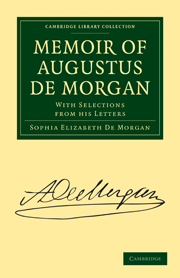Book contents
- Frontmatter
- PREFACE
- Contents
- SECTION I FROM 1806 TO 1827
- SECTION II FROM 1827 TO 1831
- SECTION III FROM 1831 TO 1836
- SECTION IV CORRESPONDENCE FROM 1831 TO 1836
- SECTION V FROM 1836 TO 1846
- SECTION VI CORRESPONDENCE FROM 1836 TO 1846
- SECTION VII FROM 1846 TO 1855
- SECTION VIII CORRESPONDENCE FROM 1846 TO 1855
- SECTION IX FROM 1856 TO 1865
- SECTION X CORRESPONDENCE FROM 1856 TO 1866
- SECTION XI FROM 1866 TO 1871
- SECTION XII CORRESPONDENCE FROM 1867 TO 1870
- LIST OF WRITINGS
- INDEX
SECTION XII - CORRESPONDENCE FROM 1867 TO 1870
Published online by Cambridge University Press: 29 August 2010
- Frontmatter
- PREFACE
- Contents
- SECTION I FROM 1806 TO 1827
- SECTION II FROM 1827 TO 1831
- SECTION III FROM 1831 TO 1836
- SECTION IV CORRESPONDENCE FROM 1831 TO 1836
- SECTION V FROM 1836 TO 1846
- SECTION VI CORRESPONDENCE FROM 1836 TO 1846
- SECTION VII FROM 1846 TO 1855
- SECTION VIII CORRESPONDENCE FROM 1846 TO 1855
- SECTION IX FROM 1856 TO 1865
- SECTION X CORRESPONDENCE FROM 1856 TO 1866
- SECTION XI FROM 1866 TO 1871
- SECTION XII CORRESPONDENCE FROM 1867 TO 1870
- LIST OF WRITINGS
- INDEX
Summary
To Sir John Herschel.
91 Adelaide Road, March 25, 1867.
1867
My dear Sir John,—‘How do you bear this trying weather?’ asked a friend during the late froid d'enfer, as a Frenchman might say. ‘Trying weather!’ said I; ‘convicting weather! sentencing weather! penal servitude weather!’
The question between me and the College is simple. I entered that College on what all the world knows was its loudly vaunted principle, that the creed of neither teacher nor student was to be an element of his competence to teach or to learn. After forty years of existence the College, for worldly reasons, has decided that a teacher must not be too well known to be heterodox: he must not be conspicuous as a Unitarian. Breach of faith, surrender of principle, and D. I. O.
But this is not all. Between ourselves, the candidate who has been refused the chair of Mental Philosophy because he is so very wicked a Christian in religion, is also excluded because he is too much of a theist in philosophy. He cannot help founding his psychology on a moral Governor of the universe.
Now, I would not have objected to leaving the existence of God and His action on the minds of men an open question for the best qualified candidate to treat in his own way; but the interference of the College as a college, and a settlement of that question officially, is a step in which it concerns me, with my way of thinking, to take a part.
- Type
- Chapter
- Information
- Memoir of Augustus De MorganWith Selections from His Letters, pp. 369 - 400Publisher: Cambridge University PressPrint publication year: 2010First published in: 1882



